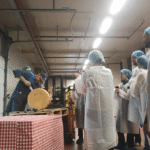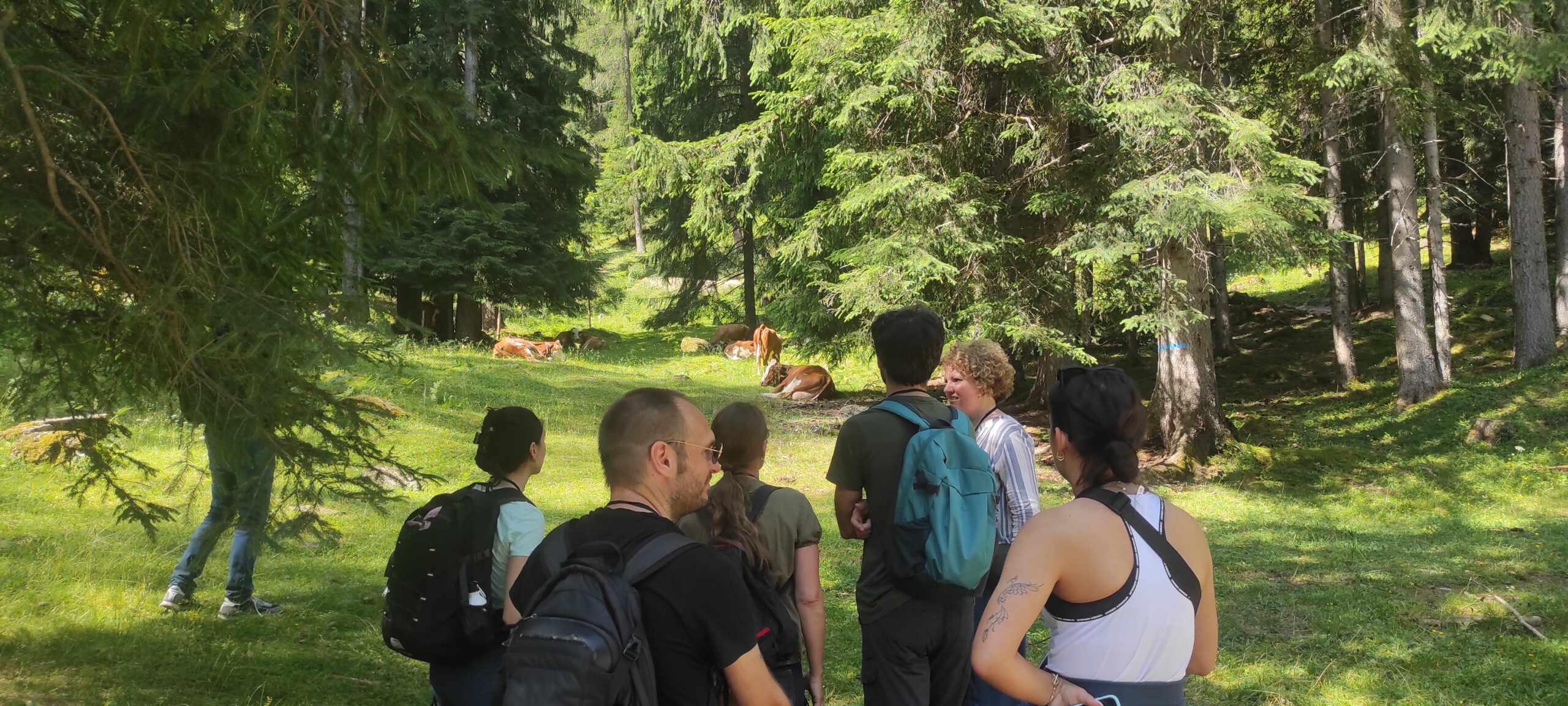As part of the VISIONARY project’s ongoing commitment to fostering dialogue and collaboration among food system actors across Europe, the University of Trento hosted a two-day Cross Country Visit in the province of Trento on 23–24 June 2025. The event gathered a wide and diverse group of stakeholders—including researchers, farmers, cooperatives, local institutions, innovation hubs, and representatives from the dairy industry—to explore sustainable practices, innovative business models, and governance mechanisms that support resilient and biodiversity-friendly dairy systems.
The first day was dedicated to field visits and immersive experiences in traditional and cooperative-based dairy systems of the Trentino region. Participants began their journey in Val di Rabbi, visiting Malga Fratte, a high-altitude alpine farm practicing transhumance-based livestock grazing and artisanal dairy production. The owners shared their integrated business model, which combines milk and meat production, cheesemaking, and agritourism—demonstrating how such multifunctional farms not only sustain rural livelihoods but also contribute to biodiversity and landscape stewardship. The visit concluded with a traditional alpine lunch featuring cheeses and cured meats produced directly on-site, offering a taste of the territory’s unique agroecological identity.



In the afternoon, the group moved to Trento to visit the Consortium of Trentino Social Dairy Farms (CONCAST), where they explored the facilities of Trentingrana, a regional parmesan-style cheese. The CONCAST team presented the cooperative’s long-standing history, the collective organisation of small-scale producers, and its marketing strategies oriented toward sustainability and quality certification. The discussion highlighted the relevance of social enterprise models, cooperative structures, and short supply chains in maintaining the economic and cultural vitality of mountain dairy production.
Throughout the day, participants engaged in meaningful exchanges with local actors and institutions. Among those present were representatives from Trentingrana, Trentino Marketing, the University of Trento, and the Italian dairy industry, alongside international guests from FiBL Deutschland (Research Institute of Organic Agriculture), Cooperativa Kaiku and Cooperativas agro-alimentarias de España, as well as Highclere Consulting (UK). Their perspectives enriched the dialogue on how alpine regions can combine traditional knowledge with cooperative innovation.
The second day of the event took place at the Department of Economics and Management of the University of Trento, featuring a workshop that brought together experts and practitioners to explore key challenges and opportunities in the transformation of dairy supply chains. The morning session opened with Prof. Cerroni (University of Trento), who presented the main findings of the VISIONARY project. This was followed by Dr. Bertanza (Agriduemila Hub Innovation), who introduced the EcoLivestock initiative; Dr. Barichello (Cooperazione Trentina), who discussed local Food District Initiatives and emerging models of food system coordination, animal welfare, and territorial governance; Dr. Pellegrini (Trentingrana – Consorzio Caseifici Sociali Italiani), who addressed local marketing and communication strategies to support short food supply chains; Dr. Bazzoli (Federazione Provinciale Allevatori di Trento), who provided an overview of sustainable dairy farming in alpine contexts; and Dr. Martinelli (ARAL – Associazione Regionale Allevatori Lombardia), who shared insights on sustainability in lowland dairy systems.
The workshop provided a platform for discussing sustainable dairy practices across both alpine and lowland regions. Case studies and open dialogue enabled participants to reflect on the ecological, economic, and social dimensions of sustainability in dairy production. The event brought together a diverse group of stakeholders, including public institutions such as the Provincia Autonoma di Trento and CAMCOM Trento; research and innovation centres like Fondazione Edmund Mach and its Research and Innovation Centre; sectoral organisations including Asnacodi Italia, Federazione Trentina della Cooperazione, and Co.Di.Pr.A.; agricultural cooperatives such as Cooperativa Kaiku and Cooperativas Agro-alimentarias de España; and innovation actors like Agriduemila Hub Innovation.
The richness of backgrounds and expertise generated a vibrant and collaborative environment, where policy perspectives, scientific research, and on-the-ground practices could intersect. Participants left the workshop with a shared understanding of the importance of place-based solutions, cooperative governance, and innovation ecosystems in driving a sustainable transformation of the European dairy sector. The visit not only strengthened cross-country learning and networks but also laid the foundation for future collaboration toward more inclusive and biodiversity-aligned food systems.
